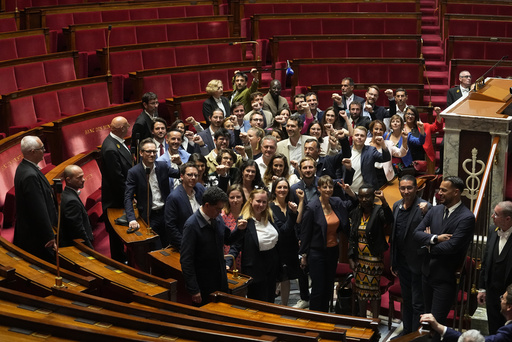PARIS (AP) — Newly elected lawmakers arrived Tuesday at the National Assembly, France’s lower house of parliament, for talks seeking to cobble together a government majority after a chaotic election result left the legislature split among left, center and far-right parties.
President Emmanuel Macron on Monday asked his prime minister, Gabriel Attal, to continue handling day-to-day affairs, less than three weeks before the start of the Paris Olympics. Macron leaves Wednesday for a NATO summit in Washington.
Sunday’s election left no faction even close to the majority needed to form a government, raising the risk of paralysis for the European Union’s second-largest economy. While a fractured parliament is not uncommon in Europe, the situation is unprecedented in France’s modern history.
Leaders of the leftist coalition, the New Popular Front, which won the most seats, say they should form a new government. The three main parties in the coalition — the hard-left France Unbowed, the Socialists and the Greens — began negotiations to find a candidate for prime minister.
The New Popular Front “is the leading Republican force in this country and it is therefore its responsibility to form a government … to implement the public policies expected by the French people,” Green lawmaker Cyrielle Chatelain said.
Hard-left lawmaker Mathilde Panot said, “France Unbowed lawmakers are going into the National Assembly not as an opposition force… but as a force that intends to govern the country.”
Their talks are complicated by internal divisions. Some are pushing for a hard-left figure while others, closer to the center-left, prefer a more consensual personality. France’s prime minister is accountable to parliament and can be ousted through a no-confidence vote.
Members of France Unbowed and the Greens arrived Tuesday morning at the National Assembly. The Socialist lawmakers, who include former President Francois Hollande, were to gather in the afternoon.
The top negotiator for the Socialist party, Johanna Rolland, said the future prime minister won’t be Jean-Luc Mélenchon, the divisive hard-left founder of France Unbowed who has angered many moderates.
Speaking on France 2 television Tuesday, she suggested the leftist coalition could possibly work with center-left members of Macron’s alliance. “We will be open,” she said.
Mélenchon, who did not run in the legislative elections, also joined the talks at the National Assembly on Tuesday afternoon.
Yael Braun-Pivet, a member of Macron’s centrist alliance and former president of the National Assembly, said “in my view, the French people sent us a clear message. They did not want to give an absolute majority to any specific political bloc so they’re ordering us to listen to one another, work together and that’s what we need to do.”
According to official results, all three main blocs fell far short of the 289 seats needed to control the 577-seat National Assembly, the most powerful of France’s two legislative chambers.
The results showed just over 180 seats for the New Popular Front leftist coalition, which placed first to beat Macron’s centrist alliance, with more than 160 seats. The far-right National Rally party of Marine Le Pen and its allies were restricted to third place, although their more than 140 seats were still way ahead of the party’s previous best showing of 89 seats in 2022.
Macron has three years remaining in his presidential term.
___
Associated Press journalist Jeffrey Schaeffer contributed to this story.
___
Follow AP’s global election coverage at https://apnews.com/hub/global-elections/
Source: post





